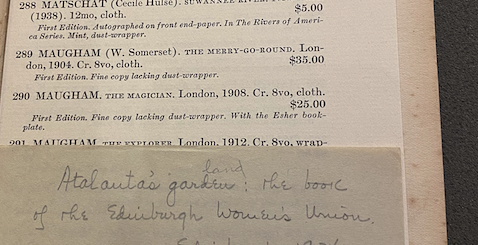Quennell and Woolf Commiserate Over Modern Poetry (1932) by Ginny N.
A Letter to Mrs. Virginia Woolf, by Peter Quennell (1932) Hogarth Press



For this assignment, I looked into the letter from Peter Quennell to Virginia Woolf that was originally published in 1932. The letter is a response; Woolf’s initial letter to Quennell concerned a young poet who had come to her for advice and critique. Although no excerpts from the young poet’s work is included in the published letter, Quennell says that his work seems to have struck Woolf as “tuneless and dull.” Quennell judges the young writer’s work similarly, even saying that Woolf wasn’t harsh enough on her critique of the poet. The dialogue gets more interesting as he delves into a question Woolf appeared to have raised, one of whether the poet is “a victim of contemporary circumstance” or is “simply a bad writer.”
Quennell writes about the history of poetry as if he and Woolf had discussed this many times. He compares the disappearance of dramatic and didactic poetry after the Victorian era to the “decay… with the mechanical turn of modern life with its hurry and bustle” of emotional poetry. Quennell expresses frustration with the ways that modern writers try to constantly reinvent words, prove their intellectuality, and get lost from the emotions at the heart of poetry. From the way Quennell discusses this, it seems clear that he and Woolf agreed on these aspects of modern life and art and had written about it before. Quennell’s advice for Woolf and her poet is patience. After a few years he says, maybe the poet’s predilection to overthinking poetry would fade and his work will be more touching. However, isn’t it impossible to separate oneself from one’s historical moment?
It’s curious how Woolf and Quennell might view themselves in terms of their own contemporary circumstances. Quennell writes to her, “most verse written in the twentieth century, whether the poet is prepared to admit it or not, represents a frenzied effort to gain time.” Considering that most of Woolf’s short-stories like “The Lady in the Looking Glass” and “The Mark on the Wall” represent singular moments in time drawn out over multiple pages, it would seem that Woolf herself falls into this category of writers pulling back against the passage time. I wonder if it matter if she is aware that this theme could be a product of her contemporary circumstances. I would want to hear more from Woolf about how or if self-awareness affected her writing and style and how this could relate to her mentee.
This letter really illustrates the fact that Woolf viewed her writing as poetry despite most of her work (that we’ve read in this class at least) being novels or fiction. I had my suspicions before reading Quennell’s letter about Woolf’s experience with poetry. She writes too smoothly, too lyrically, to not have studied poetry. You can feel her words, not just read them. Below are two examples of her writing style:
- “The room that afternoon was full of such shy creatures, lights and shadows, curtains blowing, petals falling – things that never happen, so it seems, if someone is looking.” (“The Lady in the Looking Glass: A Reflection”)
- “Wood is a pleasant thing to think about; It comes from a tree; and trees grow, and we don’t know how they grow. For years and years they grow, without paying any attention to us, in meadows, in forests, and by the side of rivers – all things one likes to think about. The cows swish their tails beneath them on hot afternoons; they paint rivers so green that when a moorhen dives one expects to see its feathers all green when it comes up again.” (“The Mark on the Wall”)
As her friend Peter Quennell says, “this is what poetry should be, felt in the brain and along the nerves.” Relating this back to the question of contemporary circumstances, I wonder if Woolf’s identity as a poet, even as she wrote largely in fiction and novel forms, comes partly from the Victorian era association of poetry with the higher-class.
Questions
Can we classify Woolf’s short stories as poetry? If so, why?
Is it possible to separate literature from the historical time period it’s written in?
What does it take to be a talented writer or poet? What makes a piece of writing “good”?









Recent Comments